Archive for April, 2016
Guest Post: Communication Teams are Paramount in Today’s Church by Brian Dunaway
 Today, RonnieFloyd.com welcomes guest writer, Brian Dunaway. Brian is the Director of Communications & Technology for Cross Church Northwest Arkansas.
Today, RonnieFloyd.com welcomes guest writer, Brian Dunaway. Brian is the Director of Communications & Technology for Cross Church Northwest Arkansas.
There is no argument that quality and effective communication are paramount in today’s world. Even more important, in the church world it is vital to cut through the noise and grab the attention of those both inside and outside your church. Regardless if you are a one-person communications staff, you outsource to lay people or freelancers, or you have an entire staff dedicated to communications, I believe the points below apply.
An Effective Team
As with any organization, it takes many parts to achieve the main goal. In the world of communications, it’s important that an effective team is constructed to carry out the needs of a church. Those needs can range from the pastor’s slides for his sermon, to letting the community know where you’re located via your website, print, or social media. So what do you need?
- Collaboration – If you can’t get along, you can’t produce. You must build a staff, group of lay people, or freelancers who are willing to work together. Your team must be able to share ideas, disagree, agree, and eventually come together to produce a product that is fantastic.
- Servant Heart – The communications team as a whole is a unique ministry of the church. It is our job to not only communicate the big picture of the church, but also to serve the individual ministries of the church. Your team must be able to interact and communicate with each staff member while understanding the importance of keeping the overall vision clear.
- Talent – It’s not by accident I put talent last. The world is FULL of talented people. It’s not hard to find talent, especially in the field of communications. Schools are churning out scores of graphic designers, web managers, and video editors. I firmly believe if your team has all the talent in the world but cannot work as a team and be servants to many, they will ultimately accomplish nothing.
Gratefully, this is exactly the team I have the opportunity to work alongside at Cross Church. We have a team that is uniquely gifted, highly creative, and most importantly, each has a ministry heart.
Quality Within Your Box
Churches have so many different cultures, traditions, and expectations. We will just call it flavor. It is of utmost importance to know the flavor of your church and how to best communicate it. You must communicate who you are as a church. Not the church you wish you were, but the church you are. Social media is a great platform to let people know who you are. Make sure you and your church are designing and communicating in a way that is relevant to the culture.
Remember this: You can earn the right for people to notice your church by your attention to detail in quality, spelling, artwork, and more. But it’s just as easy to forfeit that right with carelessness. Strive to have the highest quality in every area. At Cross Church, we have very strict policies to help insure we spell words correctly, post quality content, etc. But we are all human and sometimes we make mistakes. When that happens, we look at the system, tighten it up, and continue on. The bottom line is not to settle for “good enough” when you can do it with excellence.
The Front Door
Unfortunately, in today’s world, the old adage, “Don’t Judge a book by its cover” is no longer applicable. I tell the team I serve alongside at Cross Church, “Don’t let yourselves ever believe you are the sole reason the church grows.” However, what you create and communicate through your talents might cause a seeker to look twice. They may give your church a chance when they might not have before, and this could lead to eternal life change. What an honorable task we have to be the communicators for our church! Examples of the “front door” could be your website, a TV commercial, a radio advertisement, and even a Facebook, Instagram or Twitter account. Make sure the front door represents you well.
Finally, be effective, be consistent, and produce the highest quality that speaks to who you are as a church. Always use the communication platform to strengthen the mission. At Cross Church, our mission is to reach northwest Arkansas, America, and the world for Jesus Christ. Everything we do centers on that mission and it is how we judge our effectiveness.
There are many churches that are served well by their communications teams, and we are always observing and learning from them. At Cross Church, our communications team is always available to help in any way. We will share anything we do with you and your church. Below are a few examples of how we communicate internally and externally at Cross Church.
Graphics
Click image to enlarge
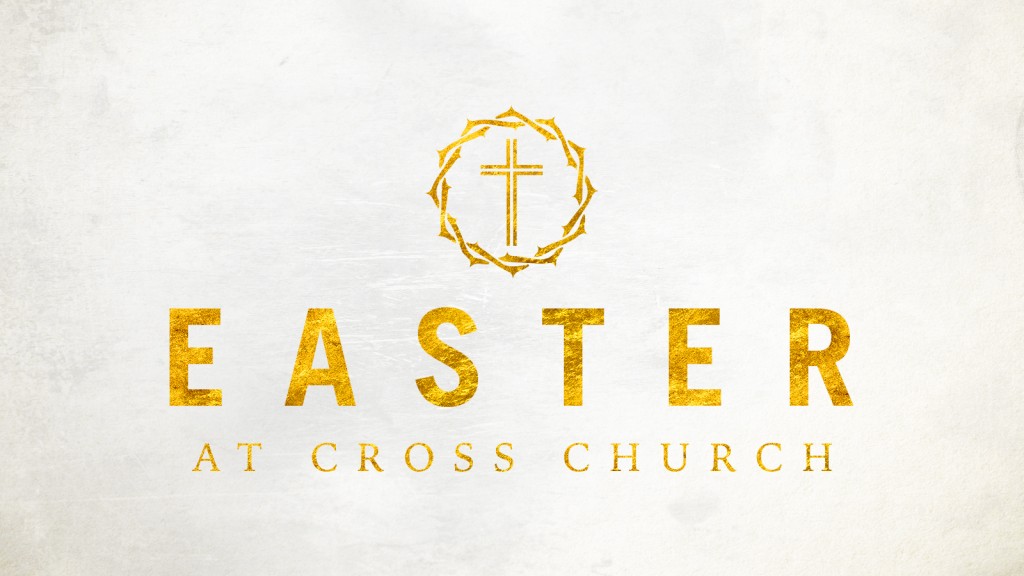 |
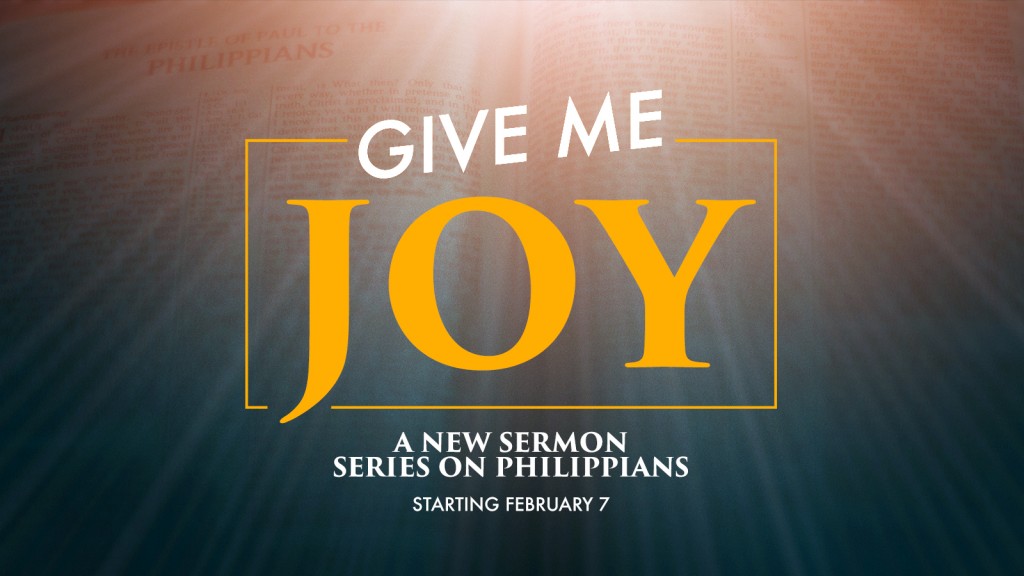 |
| Easter 2016 Artwork | Give Me Joy Series Artwork |
Social Media
Click image to enlarge
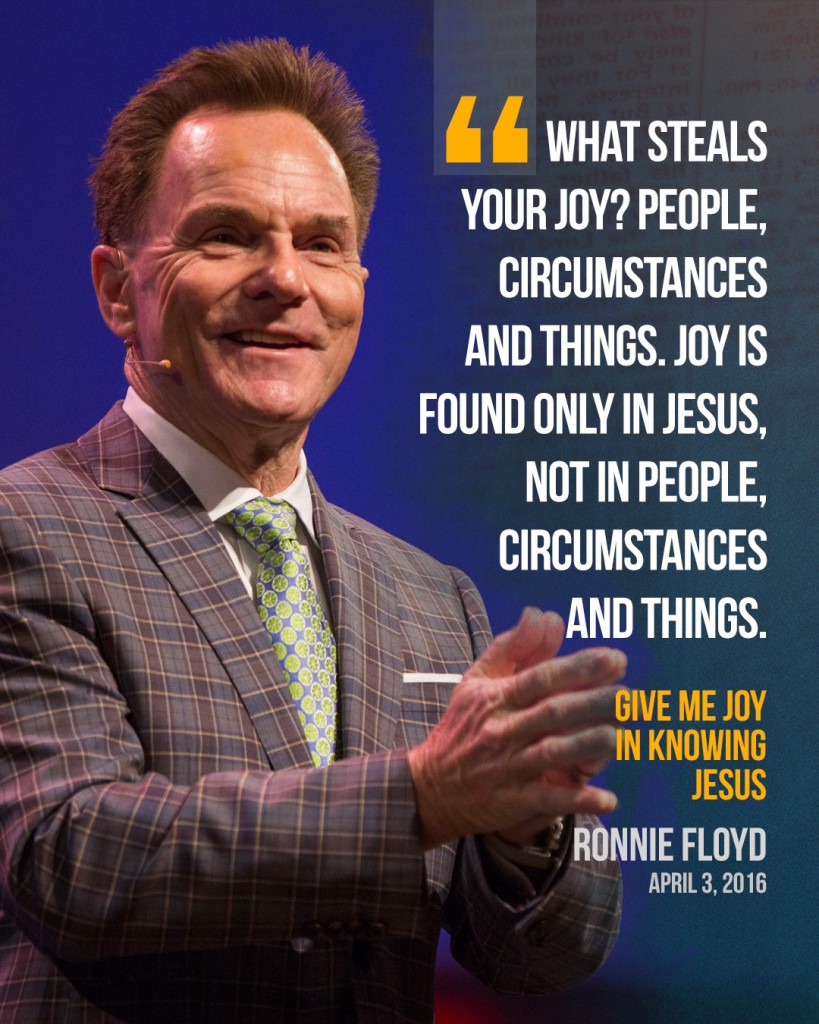 |
 |
 |
| Dr. Floyd Quote | Blessing Baskets 2016 | Plan My Visit |
Bulletins
Click image to enlarge
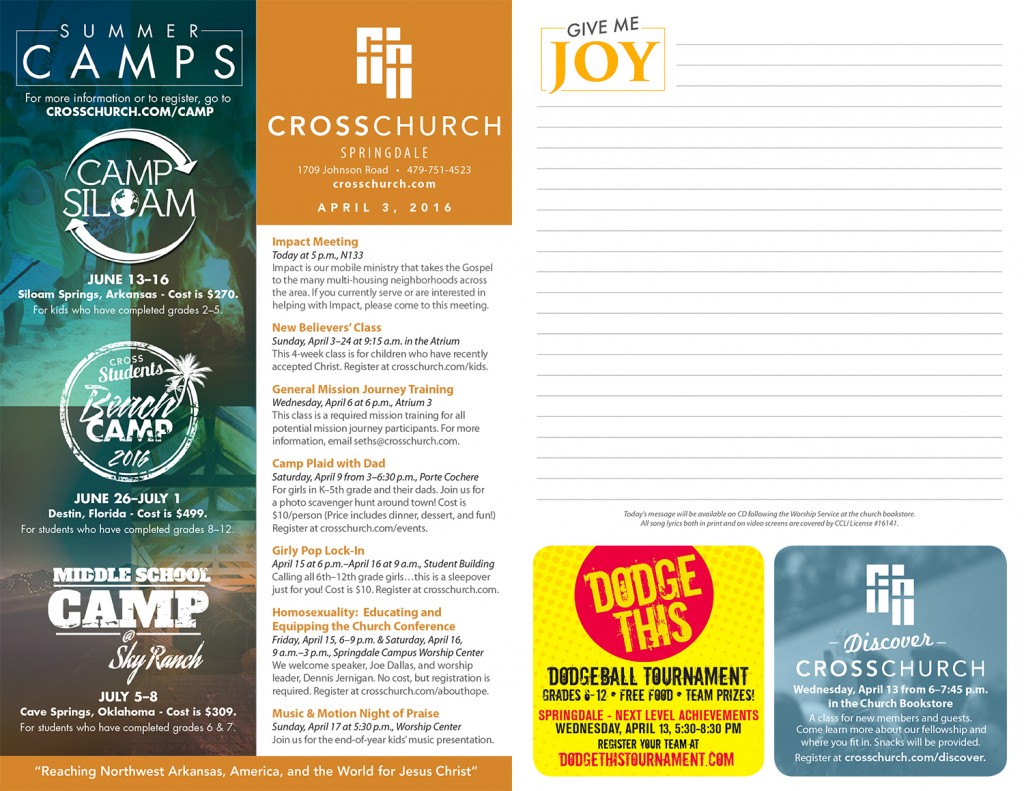 |
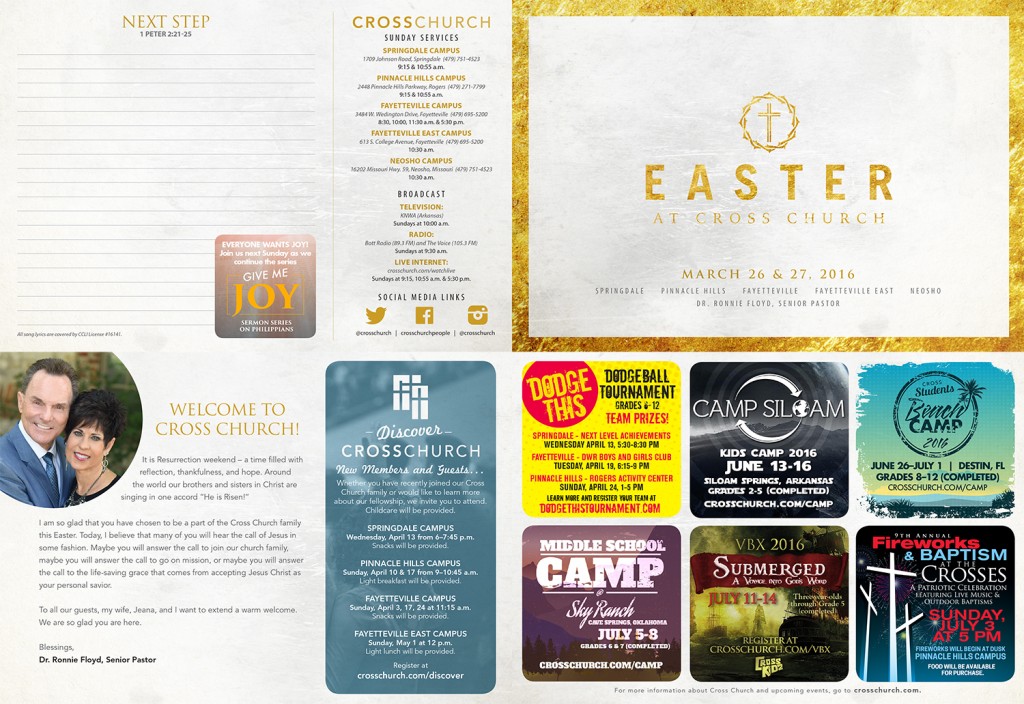 |
| Weekly Bulletin | Special Easter Bulletin |
Videos
Click to play video
| Easter 2016 Recap | Easter Promo |
Brian Dunaway
Director of Communications, Cross Church
A Cooperative Program for Today and a Cooperative Program for the Future
Last fall before speaking at one of our state conventions, I had the privilege to meet a man employed by another major denomination. As we were talking, I asked what he felt was one of the biggest challenges in their denomination.
He said their biggest problem is their churches not funding missionaries like they used to. He stated they are searching for a new way to get this done because when the missionaries come to their churches to raise their individual financial support, the churches are doing so much themselves, they no longer feel they need the missionaries. Additionally, due to the changing nature of church life and the economy, churches are struggling to support missionaries individually and consistently.
Then he stated, “You guys seem to do that so well.” I told him about the Cooperative Program and the way it functions. I explained it is not just the way we fund our international missionaries, but also our ministries and mission work statewide and nationally. He was amazed and very complimentary.
I believe a Cooperative Program for today and a Cooperative Program for the future has to be built upon five major convictions.
Conviction #1: MISSION, NOT MONEY
The driving engine of the Cooperative Program is not money, but the mission of God to redeem the world from sin. The final orders of Jesus before He ascended to heaven were the words given to us in Acts 1:8,
But you will receive power when the Holy Spirit has come on you, and you will be My witnesses in Jerusalem, in all Judea and Samaria, and to the ends of the earth.
His final words were not, “Give money to the Cooperative Program.”
The compelling mission of Jesus Christ to be His witnesses regionally, statewide, nationally, and internationally is what the Cooperative Program has been built upon, is built upon, and must be built upon in the future.
This is why churches give through the Cooperative Program, not to the Cooperative Program. We give through the Cooperative Program in order to fund our work together with one compelling cause: presenting the gospel of Jesus Christ to every person in the world and to make disciples of all the nations.
I am convinced the more we talk about what we are doing to accomplish this mission, the more dollars will flow through the Cooperative Program.
Conviction #2: UNITY, NOT UNBELIEF
The Cooperative Program is our unified plan of giving. It places us shoulder-to-shoulder in our work together, regardless of the size of our church, the color of our skin, or our location in America.
When we continually question this plan, we represent uncertainty to generations of Baptists. Clashing opinions lead to an unseemliness that affects our mission effectiveness.
Entertaining societal methodology jeopardizes our unified plan of giving. Just as it would damage a church’s fellowship and mission, it would even more so in our convention. We need to continue believing in the value of our unified plan of giving.
Conviction #3: COOPERATION, NOT COMPETITION
The spirit of cooperation is so important in funding our work together. A societal method of financial support would fuel competition between our state, national, and international work. The Cooperative Program eliminates competition between our entities as it provides a balanced approach for support.
Each state convention has the privilege to annually evaluate the percentage of monies utilized for their statewide ministries versus what is forwarded on to our national and international work. This is why each church needs to have representation in their state convention. As this is evaluated annually, the desires of the churches are fulfilled. The financial formula for the allocation of monies received nationally from the churches through their state conventions is regularly reviewed by our Executive Committee. I have stated this for one purpose: to let each of you know change is possible and does occur. We are working together toward a common goal.
The Cooperative Program exists to serve the churches in helping them accomplish their God-given responsibility to fulfill the Great Commission; it does not exist for the churches to serve it.
Conviction #4: PARTNERSHIP, NOT PERSONALITIES
Partnership is the key to the Cooperative Program. Churches partner with other churches through their state conventions and our national Southern Baptist Convention. Each state convention partners with other state conventions in funding the work of the Southern Baptist Convention. And our national entities partner with each other and state conventions to present the gospel of Jesus Christ to every person in the world and make disciples of all the nations.
Partnership, not personality, drives our mission. If we keep our eyes on personalities and things occur that cause tension, we may be tempted to consider our financial support as optional. This is not the wisest approach nor best for our work together.
Refuse to let personalities determine your support. If concerns exist, each state convention has an Executive Board and each national entity has a Board of Trustees. In other words, a process is in place to deal with a personality that may concern you. Baptist work is built upon our partnership together for the gospel, not on human personalities.
Conviction #5: HISTORY, NOT JUST THE HERE AND NOW
While the relevance of the here and now is important, we must never disregard the lessons from history. Southern Baptists do not need to make the same mistake our nation is making today.
Just think how many times we hear in our society that things have changed and we need to adjust our moral beliefs because of it. In other words, what is valued as truth in the here and now is more important than our own history as a nation.
I believe the Southern Baptist Convention must be relevant today. In regards to funding our work together, we do not need to return to what we walked away from ninety-one years ago, a societal method of financial support. The Cooperative Program is not perfect. But I believe this unified method of support that began in 1925 is still relevant today, and have seen others marvel at how we are able to work together to accomplish our mission.
Therefore, Southern Baptists, let’s continue forward in our work cooperating for the cause of Christ. Built upon these five convictions, we will have a Cooperative Program not just for today, but a Cooperative Program for the future.
Now is the Time to Lead,
Ronnie W. Floyd
Senior Pastor, Cross Church
President, Southern Baptist Convention
*******
Dr. Ronnie Floyd is currently serving as the President of the Southern Baptist Convention. The Southern Baptist Convention is America’s largest Protestant denomination with more than 15.7 million members in over 51,094 churches nationwide.
To request an interview with Dr. Ronnie Floyd
contact Gayla Oldham at (479) 751-4523 or email gaylao@crosschurch.com.
Visit our website at http://ronniefloyd.com
Follow Dr. Floyd on Twitter and Instagram @ronniefloyd



